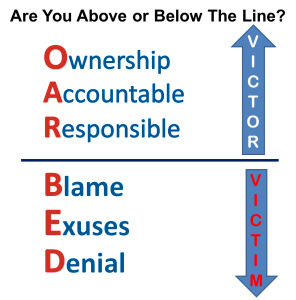Is Your Team Accountable?
When things don’t go as planned in your business; schedules missed, customer’s expectations not met, quality of work not up to standards; what do you hear? Blame, excuses, denial? Or ownership of the issue, accountability for the results and responsibility for taking corrective action? If you’re like most business owners, you hear lots of reasons and excuses. How did this culture develop in your company? How did your team come to accept this behavior as the norm in your business?
Look no further than the mirror. It starts with you. Even if you are not the one making excuses, your team has witnessed you enough times accepting blame and excuses. Or visibly punishing mistakes that are not soon forgotten. People learn the acceptable excuses for explaining why they did not achieve their goals. Rewards for exceptional performance barely exceed rewards for the ordinary. And people hide the truth – to be polite and safe – and in denial.
Why is Accountability important?
It closes the gap between intention and action. Between plans and results. Between goals and success. And its the foundation of an ethical business culture. If you focus on or change nothing else but accountability in your business, you will see massive results.
Accountability and empowerment are inseparable. When someone is blaming and making excuses, they see the cause and solution as being outside of themselves. Outside of their control, influence and power. They have no capability or power to change the outcome. Accountability is a promise and an obligation, both personally and to the people around you, to deliver specific, defined results.
Accountable people are aware of the positive and negative consequences of their actions – they want different consequences – they take different actions. A team organized for accountability, to achieve a desired result, immediately becomes interdependent. In order to achieve effective interdependence, you must have the structure to support it in place. Accountability in your business requires structure, focus and clarity that supports and builds trusted relationships and gets results.
Where to Start – Key Principals of Accountability
- A personal promise – that you agree to
- Results means activities are not enough – you do whatever it takes to achieve results
- Results requires room for judgment and decision-making – empowerment to use discretion
- Neither shared nor conditional – you are responsible for your commitments – not shared with another and it is unconditional regardless of limited control, other’s mistakes, or a lack of role clarity.
As soon as you hear yourself saying “ . . . because . . “ STOP, rethink what you’re about to say. Rephrase it until you are clearly taking full responsibility, describing a situation where YOU have control to do something different. Start with you. It will not go unnoticed by your team.

